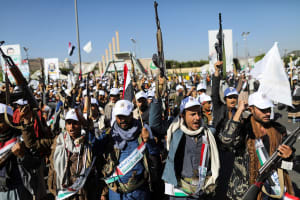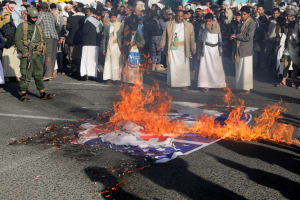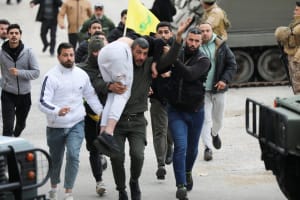Israeli leaders debate whether to strike Iran to stop Houthi attacks
Reports say Netanyahu and Mossad chief Barnea are divided about how to handle the Houthis

Following an increase in attacks from Iranian-backed Houthi rebels in Yemen, the Israeli government is reportedly weighing its military options for dealing with the threat.
According to reports in Israeli media, Israeli leaders are debating an escalation in strikes against the Houthi rebels in Yemen, which is said to be the strategy favored by Prime Minister Benjamin Netanyahu, or to strike against Iran directly, as the initiator of the attacks, said to be favored by Mossad Director David Barnea.
Israel’s defense leaders have decided to turn their attention to the Houthi issue after disabling Hezbollah forces on the northern border with Lebanon.
The Houthi rebels have slowly increased the number of ballistic missile and drone launches since the signing of the ceasefire agreement in Lebanon, and the current assessment is that Iran is partially behind that increase in attacks.
At present, the Houthis appear to be following a strategy of one launch per day, using either a ballistic missile, a drone, or both.
Accordingly, the debate among the leadership centers on the best strategy for ending their attacks. Netanyahu is advocating for increased strikes on Houthi military sites and even targeting the leadership directly, similar to what Israel did with Hezbollah forest in Lebanon.
On the other side, Barnea supports dealing with the “head of the octopus,” Iran, a position also supported by former IDF chief and Knesset Member Benny Gantz.
Barnea, reportedly believes that due to the weakened state of Iranian air defenses following the Israeli strikes in October, the Israeli Air Force (IAF) would be able to easily target sensitive Iranian sites. This, he suggests, could convince the regime’s leaders to back off and order the Houthis to desist from further attacks.
During a ceremony for the lighting of the first candle of Hanukkah with employees of the Prime Minister's Office, Netanyahu said, "The Houthis will also learn what Hamas, Hezbollah, the Assad regime and others have learned, and even if it takes time, this lesson will be learned throughout the Middle East.”
A report in N12 News stated that the IDF believes a war of attrition with the Houthis could last for weeks. Israeli analysts have also noted that Israel does not have the same deep level of intelligence, resources and background in Yemen that it had developed over decades of conflict with Hezbollah in Lebanon.
At present, the Houthis can launch missiles and drones on a daily basis, and Israel is still gathering intelligence on the rebels' assets to establish a list of sites to strike.
Because Barnea believes the Iranian regime would act to support their Yemen-based proxy in the event of an escalation, he said a direct strike against the Islamic Republic could shorten the conflict, and force Iran to order the Houthis to stop launching their strikes.
However, other defense leaders are less convinced of this assessment, suggesting that Iran's influence over the Houthis is not as direct as its control over Hezbollah.
Netanyahu also reportedly believes that Israel should wait until U.S. President-elect Donald Trump takes office on Jan. 20, and coordinate its efforts against Iran with the new administration.
In the meantime, Netanyahu and several other defense officials, believe Israel should strike the Houthis hard in an attempt to dissuade them from further attacks.
On Thursday morning, Maj.-Gen. (res.) Giora Eiland told Army Radio he doubts a strike on Iran would deter the Houthis, who have their own motivation for acting.
"Even if we attack Iran, it will not immediately affect the motivation and capability of the Houthis," Eiland said, adding that "capability has been built up there for many years, and they can realize it even if the Iranians are not there.”
Eiland also said that Israel currently lacks the intelligence to enable the kind of pinpoint strikes it has used against Hezbollah.
“Our main problem is not only distance, but a lack of intelligence,” he told Army Radio. “If we compare against what we did with Hezbollah, the difference is fifteen years of intelligence. We have reached places in the media and technology that have allowed us to know at any given moment who is where.”
“Experience proves that good intelligence is the key to success,” he stated.
Eiland agreed with Netanyahu, saying he believes an international coalition should be formed against the Houthis, as the issue affects more nations than just Israel.
Former Defense Minister Yoav Gallant called for further strikes against the Houthis in Yemen.
“It is possible and necessary to concentrate more effort on the Houthis, and other results can be achieved both against their leadership and against the missile system.”
Gallant also called for coordinating Israeli efforts with those of the United States.
"We need to join the American effort, because joint action by Israel and the U.S. has a practical effect – and no less than that, it will constitute preparation for future actions that we will be forced to take against Iran in the not-too-distant future," he said.

The All Israel News Staff is a team of journalists in Israel.
You might also like to read this:
















